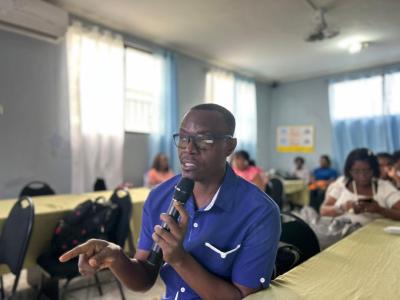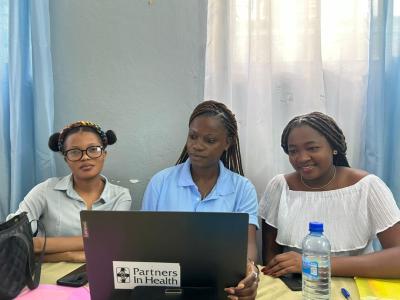Throughout Haiti, thousands of children under the age of five continue to face the silent threat of malnutrition, a condition that weakens their health and jeopardizes the country’s future. At the heart of the response, Zanmi Lasante is committed to strengthening community health systems, equipping health workers and managers with the tools, data and skills they need to prevent nutritional crises and save lives.
From October 21 to 24, 2025, ZL organized a review and capacity-building workshop in Hinche in partnership with UNICEF and the Ministry of Public Health and Population (MSPP). The meeting brought together departmental health authorities, program managers and nutrition agents from the Centre and Artibonite departments to take stock of progress and identify concrete avenues for improvement.

“This type of workshop is not just about data, but also about reflection, responsibility and collective work,” stressed one participant. For several years, ZL teams have been carrying out large-scale interventions to detect and treat acute malnutrition, while integrating preventive actions such as growth monitoring, nutritional counseling for mothers and vitamin supplementation in mobile clinics and health centers.
The training sessions combined technical analysis and practical application around three key themes:
- improving the quality of nutritional interventions,
- using Power BI (a visualization tool developed by Microsoft, which enables program data to be analyzed and transformed into interactive tables and graphs facilitating decision-making),
- and drawing up Terms of Reference in line with institutional standards.
Divided into groups, participants were able to put the knowledge they had acquired into practice by producing concrete models and tools for the program.
To encourage innovation, the best productions were rewarded, testifying to the creativity and commitment of staff involved in the fight against malnutrition.

A detailed presentation by the Direction Sanitaire du Centre (DSC) assessed the performance of the nutrition sites for the years 2023, 2024 and the period from January to September 2025. The analysis highlighted notable progress in coverage and recovery rates, but also performance gaps between sites, particularly in remote areas facing logistical challenges.
In closing, the nutrition program coordinator presented an overall summary of the program, highlighting achievements, persistent challenges and priorities for the future. Participants, divided into small groups, then proposed concrete and realistic solutions, including strengthening technical support, better use of data and closer integration between nutrition and mother and child health.
The overall atmosphere was both reflective and action-oriented. All left the workshop with a clear objective: to ensure that every child, mother and family, wherever they live, has access to adequate nutrition and quality care.
At Zanmi Lasante, this commitment is part of a broader vision: to build a strong community health system, capable of protecting the most vulnerable populations. Every training session, every home visit, every piece of data collected helps to consolidate this mission. Make a donation to support this work.
